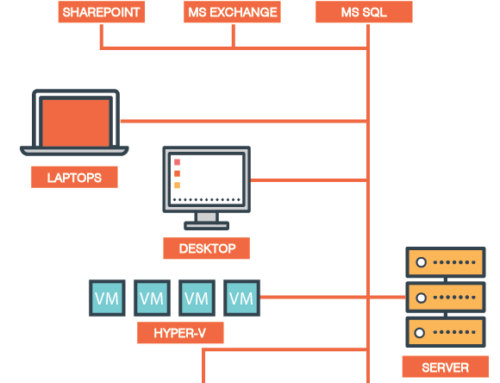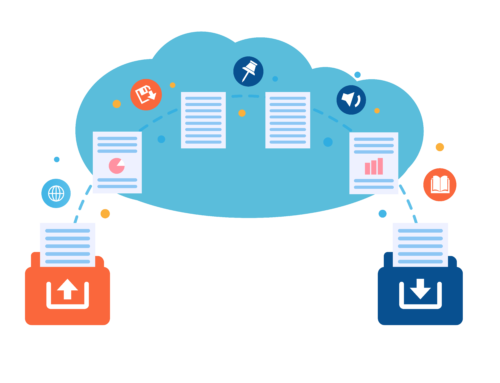Hybrid Cloud Services

In the modern era, data security is everything – and while your on-premises data centres may offer
you ease of access to your information on-site as and when you need it, can you be truly sure that
your customer and client data is as secure as it might be?
What if you need access to your data off-site, and don’t have access to on-premises resources?
What happens when you suffer a data leak or a malicious attack, and there is no clear way for you
to bounce back?
In addition to this – what if you have considered the benefits of both private cloud and public cloud
systems, but are unsure if either will work for you and your organisation?
That is where hybrid cloud solutions offer you the best of both worlds – ensuring a smooth digital
transformation that will back you and your data up no matter where you wish to operate.
As experts in the building and provisioning of hybrid cloud architectures, Datastore 365 is here to
help you move from traditional, on-site networking into a more flexible future. But, how might a
hybrid cloud model help you in practice – and how does this service differ from public cloud
resources and private cloud solutions?
What is hybrid cloud?
Hybrid Cloud refers to the combination of two or more clouds (private and/or public) in order to
provide a single solution for your organisation’s IT needs.
Private cloud solutions are typically hosted on-premises at an organisation’s site while public cloud
solutions are provided via a service provider that provides computing resources over the internet.
Hybrid cloud, however, combines both types of solutions into one platform.
This allows organisations to have access to their data and applications no matter where they are
located and also gives them flexibility to move their workloads between multiple locations as
needed. It can be very useful if you need to host your applications in multiple regions depending on
location requirements or if you want to take advantage of elasticity by being able to scale up or
down based on business demand.
How do hybrid clouds work?
The idea behind a hybrid cloud is to combine the benefits of both public and private cloud
environments while taking out some of their limitations.
In a hybrid environment, you will get the scalability and redundancy of a public cloud with the
security and control of a private cloud. You can choose which cloud components to use together to
meet specific application needs.
For example, you may decide to deploy your private cloud within a larger public cloud infrastructure
– this is known as a nested cloud deployment. A nested cloud has its own network boundaries but
shares resources such as storage and networking across those boundaries.
You can also opt to deploy all of your applications in a private cloud environment. This means that
there is no shared resource with other users.
What are the benefits of using a hybrid cloud infrastructure?
A hybrid cloud has components that reside within your enterprise network and others that live on
vendor-provided public clouds. In other words, you have access to public cloud resources, such as
storage or servers, while retaining control over your own network infrastructure. You can use these
two types of resources together, providing redundancy for applications and data without
compromising efficiency. It is, ultimately, the best of both worlds from a cloud infrastructure
perspective.
To recap:
– You benefit from a private environment for your data
– You can scale your data and server requirements as premises workloads change
– You have access to a variety of application programming interfaces without losing access to
encryption
– Hybrid cloud adoption is swift and tailored to your own needs
– Hybrid cloud computing is accessible off-site and in the field – great for remote working
– Unlike with public cloud providers, you have complete control and say over your data
What are the drawbacks of a public cloud solution?
Public cloud services, while scalable and useful in many ways, is not always the best option for all
organisations. As most businesses have found out, there are many pitfalls to avoid when using a
Public Cloud. You may be able to save money on your infrastructure by moving to the cloud, but it’s
important to understand that you will lose control over certain aspects of your business – things
like data security, privacy, and data sovereignty.
Additionally, some industries or applications do not work well with a SaaS model. There can also be
significant latency issues between systems hosted on different clouds.
What are the drawbacks of private cloud services?
Private cloud services don’t always work well for businesses because they don’t provide an easy
way to scale up or down as business needs change. While a private cloud solution is hugely
beneficial from a security perspective, there can be problems with data storage and backup. Private
clouds also aren’t very cost-effective over long periods of time. And since you’re dealing with your
own physical infrastructure, there’s no one else to call if it breaks (or even if your company decides
that it doesn’t want to pay for maintenance).
Private networks are great if you don’t intend to work remotely or grow your business – but many
businesses look for hybrid cloud vendors for the added benefits of public cloud environments, too.
FAQs
What are some of the popular uses for hybrid cloud environments?
Many business owners use a hybrid cloud service to gradually move physical workloads or data into
the cloud. What’s more, businesses can use a hybrid cloud platform to offload additional resources
from their centre infrastructure – thus increasing efficiency in-house, and enhancing developer
productivity.
Is data more secure in a hybrid cloud?
The edge that hybrid cloud business operations have over public models is that only the business
itself has access to their data. Data secured in a leading hybrid premises infrastructure also
provides users with complete, direct control over what’s in the cloud – there’s no external input or
control.
Is a hybrid cloud environment essential for business agility?
In the age of remote working, business agility is a must – hybrid cloud environments provide security
and flexibility in equal measure to ensure users can benefit both in-house and off-site. What’s more,
cost agility is boosted as hybrid cloud models can easily scale up and down with changing business
needs and demands.
Can cloud users access a hybrid model from anywhere?
Hypothetically, yes – a business’ cloud users can log in and use apps, services and data storage
from anywhere with a data connection. The very definition of cloud computing services is that they
are always floating – the Google Cloud platform, for example, is a popular example.
Why Choose Datastore 365?
Datastore 365 is a leading name in the provision of hybrid cloud resources for businesses of all
shapes and sizes.
Working with household brands such as Microsoft and Veeam, we are committed to helping SMEs
adapt to a hybrid cloud approach that ensures immediate flexibility, industry-pinnacle security and
fantastic cost value.
A hybrid cloud workload can be one you share in-house and off-site – with floating cloud
applications available whenever you need them, and the added appeal of encryption from end to
end.
If you are comparing cloud service providers and need help finding the best, most agile fit for your
business, call Datastore 365 now – or email our team – to find out more about hybrid cloud
capabilities for your enterprise.




